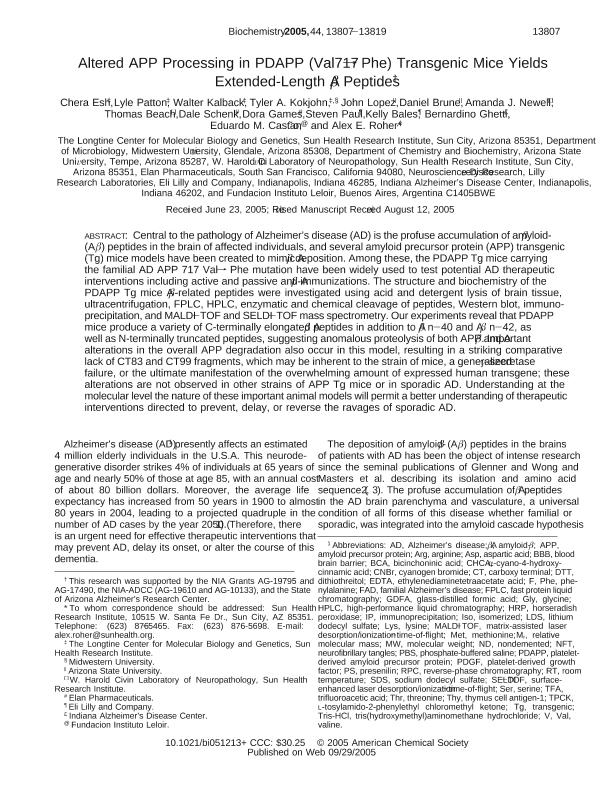Artículo
Altered APP Processing in PDAPP (Val717 → Phe) Transgenic Mice Yields Extended-Length Aβ Peptides.
Esh, Chera; Patton, Lyle; Kalback, Walter; Kokjohn, Tyler A.; Lopez, John; Brune, Daniel; Newell, Amanda J.; Beach, Thomas; Schenk, Dale; Games, Dora; Paul, Steven; Bales, Kelly; Ghetti, Bernardino; Castaño, Eduardo Miguel ; Roher, Alex E.
; Roher, Alex E.
 ; Roher, Alex E.
; Roher, Alex E.
Fecha de publicación:
10/2005
Editorial:
American Chemical Society
Revista:
Biochemistry
ISSN:
0006-2960
e-ISSN:
1520-4995
Idioma:
Inglés
Tipo de recurso:
Artículo publicado
Clasificación temática:
Resumen
Central to the pathology of Alzheimer's disease (AD) is the profuse accumulation of amyloid-beta (Abeta) peptides in the brain of affected individuals, and several amyloid precursor protein (APP) transgenic (Tg) mice models have been created to mimic Abeta deposition. Among these, the PDAPP Tg mice carrying the familial AD APP 717 Val --> Phe mutation have been widely used to test potential AD therapeutic interventions including active and passive anti-Abeta immunizations. The structure and biochemistry of the PDAPP Tg mice Abeta-related peptides were investigated using acid and detergent lysis of brain tissue, ultracentrifugation, FPLC, HPLC, enzymatic and chemical cleavage of peptides, Western blot, immunoprecipitation, and MALDI-TOF and SELDI-TOF mass spectrometry. Our experiments reveal that PDAPP mice produce a variety of C-terminally elongated Abeta peptides in addition to Abeta n-40 and Abeta n-42, as well as N-terminally truncated peptides, suggesting anomalous proteolysis of both APP and Abeta. Important alterations in the overall APP degradation also occur in this model, resulting in a striking comparative lack of CT83 and CT99 fragments, which may be inherent to the strain of mice, a generalized gamma-secretase failure, or the ultimate manifestation of the overwhelming amount of expressed human transgene; these alterations are not observed in other strains of APP Tg mice or in sporadic AD. Understanding at the molecular level the nature of these important animal models will permit a better understanding of therapeutic interventions directed to prevent, delay, or reverse the ravages of sporadic AD.
Palabras clave:
Alzheimer'S Disease
,
Animal Models
,
Proteolytic Processing
Archivos asociados
Licencia
Identificadores
Colecciones
Articulos(IIBBA)
Articulos de INST.DE INVEST.BIOQUIMICAS DE BS.AS(I)
Articulos de INST.DE INVEST.BIOQUIMICAS DE BS.AS(I)
Citación
Esh, Chera; Patton, Lyle; Kalback, Walter; Kokjohn, Tyler A.; Lopez, John; et al.; Altered APP Processing in PDAPP (Val717 → Phe) Transgenic Mice Yields Extended-Length Aβ Peptides.; American Chemical Society; Biochemistry; 44; 42; 10-2005; 13807-13819
Compartir
Altmétricas



